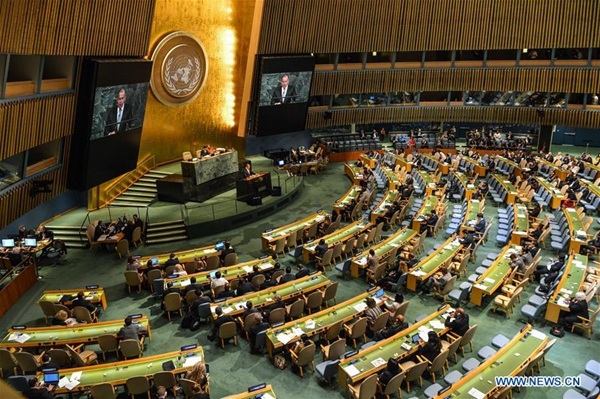The 72nd UN General Assembly - multilateralism and China
- By George N. Tzogopoulos
 0 Comment(s)
0 Comment(s) Print
Print E-mail China.org.cn, September 26, 2017
E-mail China.org.cn, September 26, 2017
|
|
|
The 72nd session of the U.N. General Assembly faces many international challenges to which China is contributing much in seeking solutions. [Xinhua/Li Rui] |
The 72nd session of the U.N. General Assembly comes at a critical juncture for world politics. Certainly, the North Korea imbroglio overshadows other themes this year.
The speech of U.S. President Donald Trump, and the threat to "totally destroy" North Korea, generates new concerns whether this constitutes a mere deterrence message or reflects his real thinking on the matter.
For his part, French President Emmanuel Macron advocated a milder approach firmly rejecting any military solution. These disagreements - only days after the U.N. Security Council agreed on a new round of sanctions against Pyongyang -demonstrate how difficult it is to efficiently deal with the issue, as well as showing how multilateralism might be challenged at any time.
This said, some new skepticism in the White House on the nuclear agreement with Iran does not, of course, write off the progress that has been made in the last two years; however, it does influence the relatively harmonious process and implementation of the deal.
Even here, Macron disagrees with Trump. In an interview with CNN he warned against scrapping the agreement. China is on the same page. On the whole, it sees the Joint Comprehensive Plan of Action (JCPOA) as an important outcome of multilateralism and a model of peacefully resolving hot international issues through political and diplomatic means.
China's support for multilateralism can hardly be questioned. With their speeches at the U.N. General Assembly in 2015 and 2016, President Xi Jinping and Premier Li Keqiang set the tone by adamantly presenting their country's position.
Foreign Minister Wang Yi is reiterating it this year. U.N. statistics show China plays a critical role in financing peacekeeping operations. It is second in 2017 with a percentage of 10.25 percent, below the American share of 28.47 percent, and above countries such as Japan (9.68 percent), Germany (6.39 percent), France (6.28 percent) and the U.K. (5.77 percent).
In terms of personnel, China currently has 155 attached to various police forces, 33 to the group of military experts and 2,515 troops.
The country's involvement is multidimensional covering different regions. For instance, it participates in MINURSO, the U.N. Mission for the Referendum in Western Sahara, with 12 representatives, and in MINUSMA, the Multidimensional Integration Stabilization Mission in Mali, with 398 personnel.
Furthermore, China is taking part in UNAMID, the African Union/U.N. Hybrid operation in Darfur, with 235 individuals, in UNFICYP, the U.N. Peacekeeping Force in Cyprus with six representatives, and in UNIFIL, the U.N. Interim Force in Lebanon, with 417 personnel.
Another issue in relation to the U.N. coming up every year at this time related to the need for reform of the world body. No one disagrees that, despite the importance of its peacekeeping missions, the U.N. often fails to provide solutions to world challenges.
Here, China and the U.S. agree on the necessity of structural changes, but disagree on their nature. The former lays emphasis on a better representation of developing countries, while the latter ignores this request and deals with problems such as mismanagement and bureaucracy.
This year, Trump attempted to push for a reform agenda based entirely on his own country's interests. Naturally, he got no support from Beijing and Moscow.
Last but not least, the significance of the U.N. for China has an even broader dimension. As a country endeavoring to eliminate poverty, it closely cooperates with the U.N. Development Program. Although it has made great progress in reducing poverty and reaching the benchmarks set by the Sustainable Development Goals, lifting more than 500 million of its citizens out of extreme poverty over the last three decades, more work needs to be done.
The U.N. program measures poverty using eight indicators, namely access to piped water, to sanitary toilets, to indoor kitchens, to living services, to financial services, to roads, to mobile internet coverage, and to nighttime light density. In this regard, problems are mostly located in south-western China. The attention of the Beijing administration is directed there accordingly.
To sum up, there are many reasons why the U.N. should remain central to the development of modern politics and economics. No doubt, the international community has high expectations, seeing it as the most representative and authoritative inter-governmental international organization.
Expectations, however, are no longer sufficient. They need to be turned into coordinated actions with an open-minded approach of the main stakeholders.
George N. Tzogopoulos is a columnist with China.org.cn. For more information please visit:
http://www.china.org.cn/opinion/GeorgeNTzogopoulos.htm
Opinion articles reflect the views of their authors, not necessarily those of China.org.cn.







Go to Forum >>0 Comment(s)